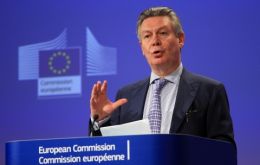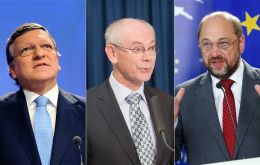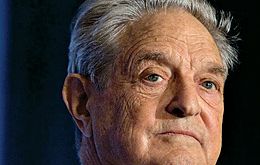MercoPress. South Atlantic News Agency
Tag: European Union
-
Monday, November 26th 2012 - 21:41 UTC
UK appeals to EU, WTO and IMO over latest Argentine ‘intimidation’ round on the Falklands

The UK is pursuing actions through the European Union, the World Trade Organization and the International Maritime Organization following the latest intimidation incidents from Argentina against the Falkland Islands and which also involve interfering with the free passage of shipping and free trade.
-
Monday, November 26th 2012 - 07:16 UTC
Chinese shoemaker wins lawsuit and compensation against the EU anti-dumping duties

Following a six-year battle Chinese shoemaker giant Aokang Group Co Ltd won a lawsuit against the European Union's anti-dumping duties. The shoemaking has encouraged other Chinese manufacturers to challenge similar “unfair policies”.
-
Monday, November 19th 2012 - 11:50 UTC
EU on collision course over long-term trillion Euro budget

European Union looks set for a new round of clashes this week as an extraordinary summit called to agree a long-term trillion-Euro budget heads for an ugly showdown, possibly even failure.
-
Saturday, November 10th 2012 - 02:35 UTC
China forecasted to become world’s largest economy, ahead of the US in 2016

China is projected to overtake the US to become the world's largest economy as early as 2016, according to a report by the Organization for Economic Co-operation and Development (OECD) released on Friday.
-
Friday, November 9th 2012 - 06:05 UTC
EU and ten Latinamerican countries end 20-year ‘banana dispute’

The European Union and ten Latinamerican countries signed an agreement on Thursday settling the longest running series of disputes in the history of the multilateral trading system, better known as the ‘banana dispute’.
-
Thursday, November 1st 2012 - 23:33 UTC
Euro-scepticism spreading in the British political system

Britain faces a crisis that could end with the world's sixth largest economy leaving the European Union, Deputy Prime Minister Nick Clegg warned ahead of a showdown over budget spending with other states in the 27-member bloc.
-
Wednesday, October 31st 2012 - 20:12 UTC
Mercosur members, except Paraguay, de-listed from EU import preference scheme

The European Union issued on Wednesday its revised import preference scheme - known as the Generalised Scheme of Preferences (GSP) - for developing countries most in need which will take effect from 1 January 2014, revealing that all Mercosur full members, except for Paraguay, will no longer benefit.
-
Thursday, October 18th 2012 - 16:07 UTC
Paymaster Germany suggests EU Executive veto power over national budgets

German Chancellor Angela Merkel demanded stronger central powers for the European Union's executive to veto national budgets that breach EU rules, risking a clash with close ally France at a summit of the bloc's leaders.
-
Thursday, October 18th 2012 - 00:46 UTC
Which of three EU delegates will actually receive the Nobel Peace Prize?

Almost a week after winning the Nobel Peace Prize, the European Union has finally decided who will collect the award. Rather than one person making the trip to Norway on Dec. 10, the EU has decided it will send three people: one to represent each of its main institutions: the European Commission, the European Council and the European Parliament.
-
Tuesday, October 16th 2012 - 07:29 UTC
Soros suggests that if Germany does not lead, it should leave the Euro

The European Union could be destroyed by the “nightmare” Euro crisis, and Germany needs to take the responsibility to save the common currency, billionaire fund manager George Soros said on Monday.
